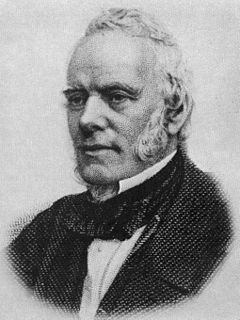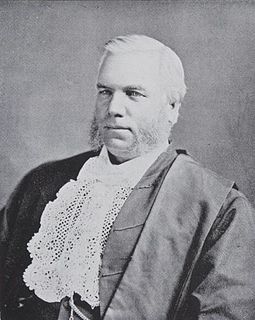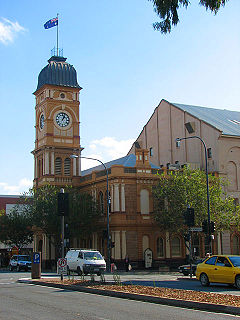
Sir John William Downer, KCMG, KC was an Australian politician who served two terms as Premier of South Australia, from 1885 to 1887 and again from 1892 to 1893. He later entered federal politics and served as a Senator for South Australia from 1901 to 1903. He was the first of four Australian politicians from the Downer family dynasty.

George Fife Angas was an English businessman and banker who, while residing in England, played a significant part in the formation and establishment of the Province of South Australia. He established the South Australian Company and was its founding chairman of the board of directors.
The South Australian Company, also referred to as the South Australia Company, was formed in London on 9 October 1835, after the South Australia (Foundation) Act 1834 had established the new British Province of South Australia, with the South Australian Colonization Commission set up to oversee implementation of the Act.

Adelaide city centre is the inner city locality of Greater Adelaide, the capital city of South Australia. It is known by locals simply as "the City" or "Town" to distinguish it from Greater Adelaide and from the City of Adelaide local government area. The population was 15,115 in the 2016 census.
Morphett Street is a main street in the west of the city centre of Adelaide, South Australia, parallel to King William Street and numbered from north to south. At its northern end it is part of the West End of Adelaide, a thriving cultural and entertainment precinct, with the Lion Arts Centre on the south-western corner of its junction with North Terrace.

Sir John Morphett was a South Australian pioneer, landowner and politician. His younger brother George Morphett was also an early settler in South Australia.

Sir William Milne was an Australian entrepreneur and politician, serving as the member for Onkaparinga in the South Australian House of Assembly from 1857 to 1868. He was elected to the South Australian Legislative Council in 1869, and was President of the South Australian Legislative Council from 25 July 1873 to 1881.

Robert Cock was one of the first European explorers of the Adelaide region of South Australia following the establishment of the colony in December 1836.
This is a list of related persons who have held positions in the two South Australian houses of parliament or represented South Australia in Canberra. It includes some notes on people with identical surnames but no clear family connection.

William Everard was a South Australian businessman and politician.
Francis Clark and Son was an engineering business in the early days of South Australia, which later became Francis Clark and Sons.
Henry Rymill and Frank Rymill were brothers prominent in business and public service in the 19th century South Australia. Henry "Harry" Rymill and Francis "Frank" Rymill were born in England, sons of Robert Rymill and Louisa Rymill of Shepperton, and migrated to South Australia, arriving at Port Adelaide in the Caucasian on 1 October 1855. Their company H & F Rymill was a prominent financial institution well into the 20th century. Their families included a number of prominent Adelaide citizens.
James Crabb Verco was an early settler in the colony of South Australia, builder, businessman and parliamentarian. He was the father of Joseph Cooke Verco.

Scots Church is a stone Uniting Church building on the southwest corner of North Terrace and Pulteney Street in Adelaide, the capital city of South Australia. It was one of the early churches built in the new city in 1850. It was built as the "Chalmers Free Church of Scotland".

John Acraman was a prominent businessman in the colony of South Australia, and has a place in the history of Australian football in that State.
South Australian Morphett families include the children of Nathaniel Morphett and Mary Morphett :

The City of Kensington and Norwood, originally the Corporate Town of Kensington and Norwood, was a local government area in South Australia from 1853 to 1997, centred on the inner eastern Adelaide suburbs of Kensington and Norwood. In November 1997 it amalgamated with the City of Payneham and the Town of St Peters to form the City of Norwood Payneham & St Peters.
Robert Haining was the first Church of Scotland minister in South Australia.
John Primrose was a Scottish distiller and brewer who had a substantial career in the colony of South Australia. He was the founder of the Union Brewery, also known as Primrose's Brewery, in Rundle Street, Adelaide, the colony's first successful brewery.
St. John's is an Anglican church at the south-east corner of the City of Adelaide dating from 1841. The first building was demolished in 1886 and its replacement opened in 1887.










